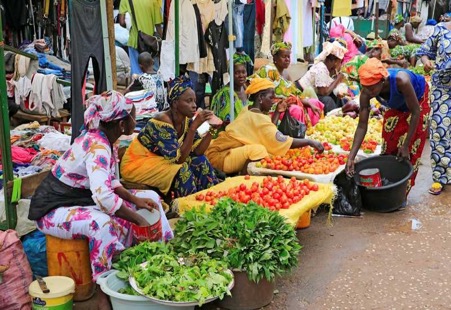
These resilient individuals are the lifeblood of local economies, contributing significantly to their families' livelihoods and the nation's economic growth.
Yet, behind their vibrant display of fruits, fabrics, and crafts lie a multitude of challenges that often go unnoticed.
In this article, we embark on a journey to shine a spotlight on the remarkable but often unspoken struggles faced by women market vendors in The Gambia. Through their stories, experiences, and voices, we will unravel the intricate web of obstacles that hinder their progress and explore the innovative solutions that promise to uplift their status in society.
Women market vendors in The Gambia, like in many other places, face various challenges, including access to capital and financial resources, which can hinder women's ability to start or expand their businesses, cause difficulty in accessing markets and distribution channels and can limit their customer base and sales potential. Also discrimination in laws and regulations can hinder women's ability to operate their businesses effectively as well as poor infrastructure, including inadequate transportation and market facilities, which pose logistical challenges for women vendors.
Women market vendors continue to scramble in search of making ends meet for their families.
The women vendors at Tujereng market face different types of struggle to improve their living conditions.
In most cases they involve in petty business to generate income when their husbands cannot sustain the family or to supplement the income of the husband.
Mariama Dibba, a fish seller at Tujereng market, says the reason she sells at the market is to provide for her children, such as buying food and paying their school fees; thus eliminate hunger and poverty at the house.
She also highlights the increasing price rise of fish, the products she sells to eke out a living.
“As a fish seller I need to either raise my prices or apportion the fish to the price the buyer can afford, so I don’t drive away customers and make it hard to stay in business. So what happens is that all the money we are making goes to the wholesalers.
Fatoumatta Darboe, a vegetable seller at Tujereng market, also narrated the difficulties she encountered in doing her business. She says she is engaged in vegetable vending activities due to unemployment and excessive poverty.
“Vegetable vending activities help me to meet my basic needs, improve my family well-being, and household street trading can offer a viable livelihood, but earnings are low and risks are high for many vendors, especially those who sell fresh fruits and vegetables. Also, inadequate storage and stocks damage are common issues.”
Madam Darboe further explained that surviving as a street vendor requires a certain amount of skill, adding that competition among vendors for space in the market and access to customers is strong at Tujereng market. As a vendor you must be able to negotiate effectively with wholesalers and customers.
Binta Saidy, a vegetable seller at Latrikunda Sabiji, said that it is very difficult for them in the rainy season because they struggle so hard to have space to sell their food items or products.
“Even to have somewhere to place how vegetables is a problem, and the market is so wet and dirty thus we struggle every day in the dirty water just to help our children and families,” she laments.
Saidy however urged the KMC to help them with more space to sell their vegetables comfortably.
Mam Fanta Touray, a fruit vendor at Latrikunda Sabiji, noted that sometimes the business she is into comes with a lot of challenges. “Storage is a problem and sometimes the business is very slow and my fruits often get spoiled and that’s a big loss to me. Another thing is the country is very hard when you invest into a business and you expect profits from it, but unfortunately costumers don't come as expected,” she said.



